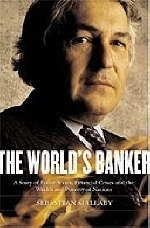
The World's Banker
A Story of Failed States, Financial Crises, and the Wealth and Poverty of Nations
Seiten
2006
|
UK ed.
Yale University Press (Verlag)
978-0-300-11676-2 (ISBN)
Yale University Press (Verlag)
978-0-300-11676-2 (ISBN)
- Titel z.Zt. nicht lieferbar
- Versandkostenfrei
- Auch auf Rechnung
- Artikel merken
Looking at the role of the World Bank in its relief work as well as the controversies surrounding its functioning, this book addresses a critical question in the context of the world's growing population. The World Bank is the leading mechanism for dealing with the consequences. Is it equal to the challenge?
Appointed president of the World Bank in 1995, James Wolfensohn struck it like a whirlwind, determined to reinvent the institution founded by Franklin Roosevelt and his world War II allies. Wolfensohn embraced debt relief for the poorest countries, put taboo subjects such as corruption on the development agenda, and faced off the riotous critics of the antiglobalization movement. Never has the World's Bank been more important, more in the public eye, or more controversial than during his tenure, when challenges from global financial crises to AIDS to the emergence of terrorist sanctuaries in failed states have threatened global security. Sebastian Mallaby's vivid account shows what it was like to reconstruct Bosnia, to combat corruption and currency collapse in Indonesia, to fight AIDS in India, to pull one in five Ugandans out of poverty. But behind the absorbing narrative lies a critical question. In the next quarter of a century the world's population will increase from 6 to 8 billion. The World Bank is the leading mechanism for dealing with the consequences. Is it equal to the challenge?
Appointed president of the World Bank in 1995, James Wolfensohn struck it like a whirlwind, determined to reinvent the institution founded by Franklin Roosevelt and his world War II allies. Wolfensohn embraced debt relief for the poorest countries, put taboo subjects such as corruption on the development agenda, and faced off the riotous critics of the antiglobalization movement. Never has the World's Bank been more important, more in the public eye, or more controversial than during his tenure, when challenges from global financial crises to AIDS to the emergence of terrorist sanctuaries in failed states have threatened global security. Sebastian Mallaby's vivid account shows what it was like to reconstruct Bosnia, to combat corruption and currency collapse in Indonesia, to fight AIDS in India, to pull one in five Ugandans out of poverty. But behind the absorbing narrative lies a critical question. In the next quarter of a century the world's population will increase from 6 to 8 billion. The World Bank is the leading mechanism for dealing with the consequences. Is it equal to the challenge?
Sebastian Mallaby has been a Washington Post columnist since 1999. From 1986 to 1999, he was on the staff of The Economist, serving in Zimbabwe, London, and Japan, as well as serving as the magazine's Washington bureau chief. He was born in England and educated at Oxford, and now lives in Washington, D.C.
| Erscheint lt. Verlag | 3.2.2006 |
|---|---|
| Sprache | englisch |
| Maße | 152 x 229 mm |
| Gewicht | 633 g |
| Themenwelt | Wirtschaft ► Allgemeines / Lexika |
| Wirtschaft ► Betriebswirtschaft / Management ► Finanzierung | |
| Betriebswirtschaft / Management ► Spezielle Betriebswirtschaftslehre ► Bankbetriebslehre | |
| Wirtschaft ► Volkswirtschaftslehre | |
| ISBN-10 | 0-300-11676-4 / 0300116764 |
| ISBN-13 | 978-0-300-11676-2 / 9780300116762 |
| Zustand | Neuware |
| Haben Sie eine Frage zum Produkt? |
Mehr entdecken
aus dem Bereich
aus dem Bereich
warum unser Geld stirbt und wie Sie davon profitieren
Buch | Hardcover (2024)
FinanzBuch (Verlag)
CHF 41,95
denken und handeln wie ein professioneller Trader
Buch | Softcover (2023)
Vahlen, Franz (Verlag)
CHF 51,65


